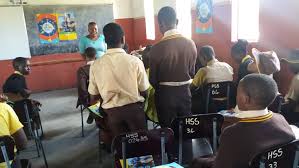Brunette Tshuma
President Mnangagwa’s mantra of “leaving no one and no place behind” is being questioned in the education system, particularly in rural areas.
Pastor Chenjerai Kangausaru of Hurungwe East notes,
“The president is always saying to not leave no one and no place behind, but our children in rural areas are being left out in the education system.”
Rural parents struggle to provide basic education for their children, while urban parents can afford quality learning institutions.
The Zimbabwe Livelihoods Assessment Committee (ZimLAC) 2024 reported that 23% of rural households do not attend school.
There are no school fees collected from rural pupils as the parents struggle to pay, funds dispersed by the Ministry of Primary and Secondary Education seemingly are not enough to meet the requirements of rural education.
Kangausaru suggests,
“More cash or scholarships should be made available for use in rural areas, especially for promising students.”
Hon. Priscilla Moyo of Mwenezi constituency shares similar concerns,
“We do not even receive the funded money at all; our children have gone to the extent of sharing textbooks due to lack of funds in rural areas.”
She continued to say compounded to these disadvantages and challenges, some students excel, but lack access to advanced education or technical colleges to acquire necessary skills.
Kangausaru confirmed the absence of a technical institute or a teacher’s college in Hurungwe East. There might a University but not all children qualify.
The Pastor went on to state that,
“What our students are being taught at secondary level is not in line with what this institute is offering, so it’s not beneficial to most of our students, besides the fact that it’s expensive.”
Because of the inadequacy of parents, Kangausaru says he offers scholarship for many children, but the government is failing to cover the glaring huge gap.
“I, myself am offering half scholarshios for these children, but parents are still struggling to pay the other required half.”
“Our children are even failing to access government scholarships in these rural areas.” He continued.
“There are several huddles that come with accessing government scholarships”, he said.
One of the seemingly endless conditions is that interviews for one to qualify they have to attend an interview conducted in Harare, which is an expense to many. He suggested that the relevant authority should collaborate with local Chiefs and Councilors on how to ensure that rural children can access government scholarships.
It would seem that the government’s Basic Education Assistance Module (BEAM) is a huge disappointment to many parents as funds are disbursed very late or not at all leaving parents no choice but to withdraw their children from school.
Challenges in Rural Education
- Lack of Technical Institutes: Hurungwe East has no technical institutes or teacher’s colleges, leaving students reliant on scholarships.
- Inaccessibility of Government Scholarships: Rural students struggle to access government scholarships due to limited information and high demands.
- Insufficient Funding: The Basic Education Assistance Module (BEAM) has failed to provide timely or sufficient funds.
While Kangausaru proposes collaboration between the government and traditional leaders to address these issues, however, the effectiveness of these solutions remains uncertain, given the existing program’s limitations.
Zim GBC News©2024


